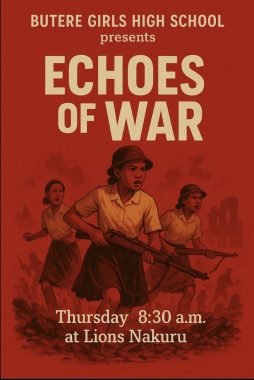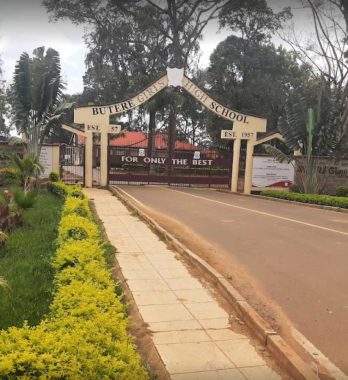A school play titled ‘Echoes of War’, authored and directed by former Kakamega Senator Cleophas Malala, has emerged as a lightning rod for political and artistic debate in Kenya, drawing the attention of police, the judiciary, and the wider public.
Staged by Butere Girls High School, the production was nearly silenced after it was banned from the ongoing Kenya Schools and Colleges National Drama and Music Festival for its politically sensitive content.
A court later reversed that decision, but controversy continues to surround the play — and the people behind it.
Here are five key things to know about the play that has sparked a nationwide conversation on freedom of expression, youth empowerment, and state censorship.
1. A play about youth, civil liberties and post-conflict governance

‘Echoes of War’ is set in a fictional nation emerging from the ashes of civil war.
At its heart is a generation of young people striving to rebuild society, hold their leaders accountable, and use digital platforms to advance democracy and justice.
The story examines the intersections of governance, technology, and civil liberties – themes that resonate deeply with Gen Z, a demographic that is increasingly vocal in political discourse.
2. The govt tried to ban it and the courts stepped in
Authorities initially barred Butere Girls from performing the play over its critical portrayal of state structures.
But on April 3, 2025, Justice Wilfrida Okwany of the High Court suspended any directive banning the school from participating in the national drama festival, ruling in favour of free expression and the right to participate in educational and artistic events.
3. Malala clash with police
Despite the court order, Malala claims he was arrested by officers from the Directorate of Criminal Investigations (DCI) while helping the students prepare for their April 10 performance.
A video shared online shows a tense standoff outside Kirobon Girls High School in Nakuru, where Malala confronts police officers who prevented him from accessing Butere Girls’ students to rehearse the play ahead of Thursday’s performance.
“I cannot be intimidated; I will write what I want, I will think the way I want,” Malala said in a defiant statement from inside a vehicle.
“Are you arresting me for scripting a play?” he lamented.
Later in the night, police teargassed journalists who had camped outside Kirobon Girls High School, covering the unfolding drama.
The blitz of tear gas forced journalists to flee for their own safety.
4. A history of defiant theatre

This is not the first time Malala has been at the center of a drama festival controversy.
In 2013, Malala scripted ‘Shackles of Doom’, a politically charged play that was also banned by the Ministry of Education but eventually performed following court intervention.
His background in theatre and school drama has long made him a provocative figure in the country’s performing arts scene.
5. Larger debate about art, politics, and youth expression
The ‘Echoes of War’ saga has raised serious questions about the limits of artistic expression in Kenya.
Critics of the government argue that attempts to suppress the play reflect growing intolerance toward dissenting voices, especially among youth.
The play’s reinstatement came with a rush to resume rehearsals, but it remains unclear whether Butere Girls were allowed to train today without further obstruction.
This year’s festival, themed ‘Leveraging Technology to Nurture Talent While Inculcating Value for Social Prosperity’, was meant to celebrate creativity and innovation. Instead, ‘Echoes of War’ has turned it into a flashpoint in Kenya’s ongoing struggle between state power and cultural expression.
Whether the students ultimately make it to the national stage or not, the impact of their performance has already reached far beyond the festival circuit – reigniting a debate that goes to the heart of Kenya’s democratic identity.
Martin Oduor
The alchemist of literary works – a master wordsmith with a proven record of transforming the raw materials of language into a rich tapestry of emotion, thought, and imagination.
View all posts by Martin Oduor